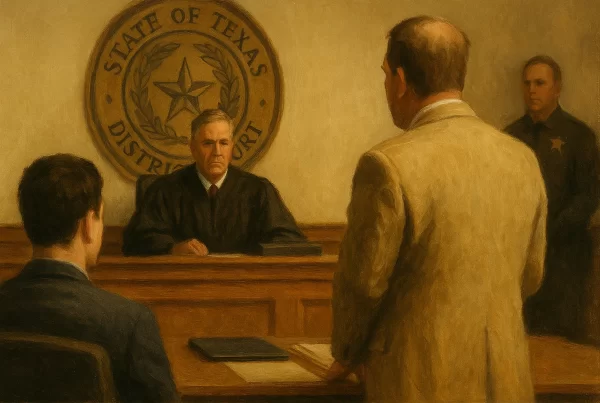The Texas Board of Pardons and Paroles decides whether to grant parole (early release) to inmates in Texas prisons and advises the Texas governor on whether to pardon convicts or commute their sentences. The board works closely with the Texas Department of Criminal Justice, which operates prisons and supervises offenders on parole.
Parole Decisions
Parole is a discretionary release from prison. Most prisoners in Texas become eligible for parole before their sentence ends. The Texas Board of Pardons and Paroles (BPP) considers tens of thousands of parole cases each year as prisoners become eligible for parole. The board determines which prisoners are to be released and under what conditions.1
The agency’s vision statement calls for it to “render just determination in regard to parole release and revocations, thereby maximizing the restoration of human potential while restraining the growth of prison and jail populations.”
The BPP uses three-member parole voting panels for most cases, with exceptions based on violent crimes identified by statute that require a two-thirds majority of the board to grant parole.2 Three-member panels typically are composed of one board member and two parole commissioners.
When an offender becomes parole eligible, a review of the offender’s file begins. An institutional parole officer interviews the offender and prepares a case summary for the voting panel. The file and case summary are then sent to the panel voters. At the request of any victim, the lead voter must interview the victim. The lead voter makes an initial decision, followed by a second voter. If they disagree, a third panel member casts the deciding vote.
Additionally, the panel may require that prisoners complete specific treatment or rehabilitation programs prior to release, and they may set special conditions for prisoners on parole.3
Parole Revocations
The BPP can revoke parole or alter parole conditions if a parolee violates the conditions of their parole. In deciding whether to revoke parole, the Board uses a graduated sanctions approach. Depending on the violation, the Board may impose sanctions or revoke parole.
In the event a parolee is alleged to have violated one or more of the conditions of release, prior to the Board revoking his or her parole, the parolee must be afforded an opportunity of a hearing to determine if sufficient evidence exists to show that one or more violations have occurred.
Denial of Parole
If an offender is denied parole, the Board is required to set a future date for parole reconsideration. This date must be set as soon as practical after the first anniversary of the denial date, except for offenders convicted of certain more serious crimes. For those convicted of violent offenses, the Board may not review the case for up to five years, and for those serving a life sentence, the date may be set up to ten years from the denial date.4
Clemency Decisions
As the name suggests, the Texas Board of Pardons and Paroles handles not only paroles but also requests for pardons and other types of clemency.
Clemency may include full pardons after conviction, commutations (reduction of a prison sentence), or medical reprieves.
Unlike the U.S. president and the governors of some other states, the Texas governor cannot pardon prisoners without a recommendation from the Board of Pardons and Paroles, though he may grant a one-time 30-day reprieve of execution.5 This restriction stems from a constitutional amendment passed in 1935 in response to accusations that Governors James Ferguson and Miriam Ferguson accepted bribes in exchange for pardons. Miriam Ferguson reportedly pardoned an average of 100 convicts a month.
Though the governor’s clemency power is limited to cases recommended by the board, he is also free to reject a recommendation of the BPP.
In FY 2020, the Board recommended clemency in 48% of noncapital cases (53 of 110). It considered eight capital cases and recommended a reprieve in one.
Organizational Structure
The Board of Pardons and Paroles is composed of seven members appointed by the governor with the advice and consent of the Senate.6 Each member serves a six-year term and is assigned to a specific region of the state, supported by a local board office. These offices are located in Austin, Amarillo, Angleton, Gatesville, Huntsville, Palestine, and San Antonio.
Each board member is assisted by two Parole Commissioners, who conduct interviews with inmates, victims, and other interested parties, and advise on release eligibility and supervision conditions. Parole review cases are generally assigned based on the prisoner’s location. The board and commissioners also receive support from a General Counsel’s Office and additional staff.
Budget and Finances
The Texas Board of Pardons and Paroles operates with a budget of about $30 million per year.
Disclaimer
This article is for informational and educational purposes only. Nothing in this article constitutes legal advice. Users assume all risk of reliance on the information included on this site.



